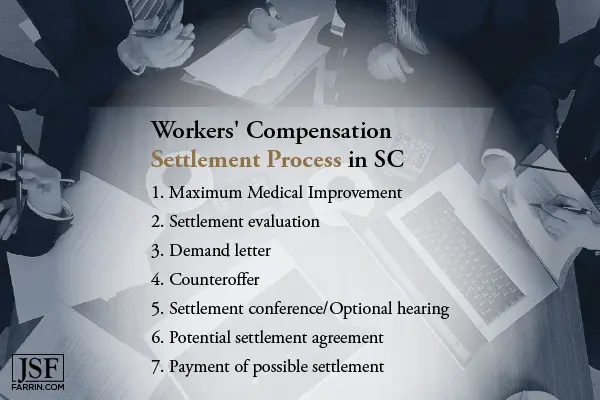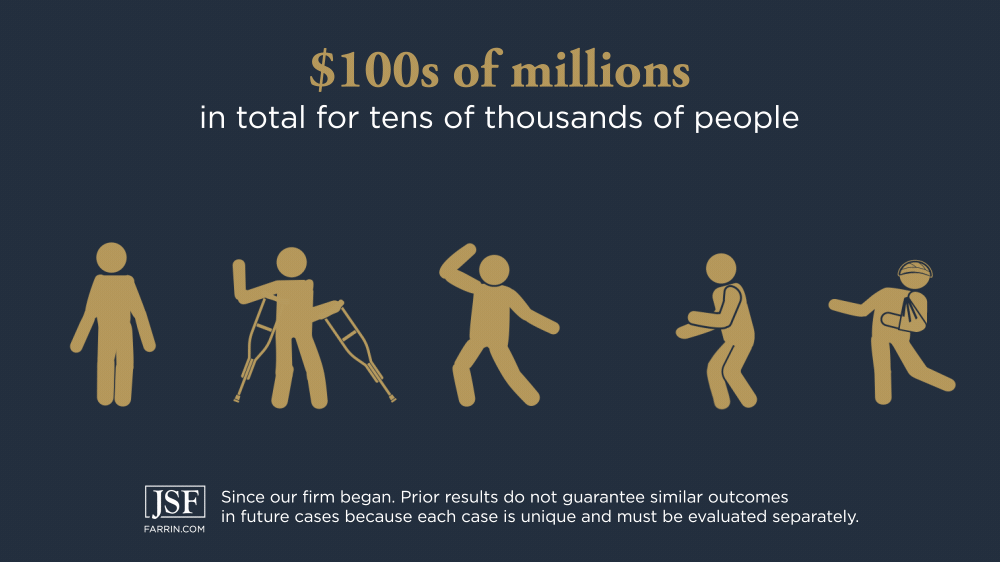Ready to settle your SC workers’ comp case?
Don’t settle for less. Here’s what you need to know and how an attorney can increase your odds of maximum compensation.

This page refers to Workers Compensation law in South Carolina.
Since laws differ between states, if you are located in North Carolina, please click here.
Note: This page includes helpful information for injured workers who have received medical and lost wage benefits after being injured at work and are ready to settle or close their workers’ compensation case. If you have recently been injured at work and are interested in learning how to try to ensure that you receive the full workers’ compensation benefits to which you may be entitled, please read this blog.
Wondering How to Calculate a South Carolina Workers’ Comp Settlement? Here’s Help.
An on-the-job injury or illness can have serious long-term physical and financial consequences for you and your family.
Under South Carolina law, employers are generally responsible for compensating eligible injured workers for the medical treatment they need and the wages they lose due to a workplace injury or sickness. Hopefully, the injured worker fully recovers and returns to their previous job with no long-term consequences.
Sometimes, however, there may be permanent effects from your injury, and you may be owed a workers’ comp settlement.
Before you close your workers’ comp claim and accept any settlement from the insurance company, consult with an experienced workers’ compensation attorney who has your best interests and needs in mind. An early settlement offer may be a way the insurance company pays you less than you may be owed.
To see if you are eligible for a settlement and how much your settlement may really be worth, call 1-866-900-7078 today for a free case evaluation.
Does Workers’ Comp Always Offer a Settlement?
No. If you recover fully from your on-the-job accident and are able to return to your previous position with no long-term consequences, workers’ comp may not offer you a settlement.
However, if you have permanent effects from your injury, need continued medical care, or have unpaid workers’ comp benefits or medical bills, you may want to seek a workers’ comp settlement.
In South Carolina, workers’ compensation settlements are voluntary. You do not have to settle your case, no matter what some insurance companies or employers may tell you. If you are approved for benefits, you can keep receiving workers’ comp for lost wages and medical care until you reach the maximum number of weeks or until the South Carolina Workers’ Compensation Commission makes an award of benefits.
And, if you are severely and permanently disabled and require continuing medical treatment, your workers’ comp attorney may advise you to let your employer or their insurance company pay lifetime wage replacement and medical benefits instead of agreeing to any settlement.
Other times, it can be in your best interest to figure out a workers’ comp settlement if you’re owed one and not have to deal with the insurance company again. An experienced workers’ comp lawyer can help you weigh your options and decide on the best path forward for you.
To get clarity on your case at no cost and no obligation, call 1-866-900-7078 today.
When Will Workers’ Comp Offer a Settlement?
Possible workers’ comp settlements are usually not negotiated until your medical treatment is completed and your doctor releases you from treatment. This is called reaching maximum medical improvement, or MMI for short.
At MMI, the doctor will decide whether you:
- have any permanent impairments
- have any permanent physical work restrictions
- may need additional medical treatment in the future
These are some of the important factors that go into determining how much your potential settlement may be worth.
Note: You may not be entitled to any additional benefits if you have received medical and lost wage benefits, recovered, and returned to work. In these cases, no settlement may be offered. If instead, you have future financial or medical needs because of your work injury, consult with an experienced workers’ comp attorney to figure out a workers’ comp settlement potential amount.
Should I Accept the Workers’ Comp Settlement Offer?
You should consider accepting a potential workers’ comp settlement offer if you have consulted with an experienced workers’ compensation attorney about your case and have negotiated a reasonable settlement amount that takes into consideration current and potential harms and damages you may be owed.
It is usually not advisable to accept the insurance company’s first potential settlement offer. While negotiating a settlement may take longer, it can also result in a better settlement.
What Are the Different Type of Workers’ Comp Settlements in South Carolina?
In South Carolina, there are three main types of workers’ compensation settlements you may be entitled to:
- A full and final clincher agreement can potentially compensate you in exchange for closing out all further benefits and releasing your employer and insurance company from all future liability. If you sign a clincher agreement, you generally give up your rights to future wage loss benefits and medical treatment in exchange for a sum of money. Note: Clincher agreements are generally paid in lump sum payments but can also be structured to be paid out in installments over time.
- An indemnity-only clincher agreement is a modified version of the clincher agreement that closes out the compensation payment part of the claim only and leaves open the medical part of the claim, thus potentially providing for any ongoing medical treatment you may need.
- A Form 16A agreement can compensate you while leaving open the medical portion of your claim in case your doctor recommends further treatment. This type of agreement also allows you to file for additional potential disability compensation if your condition worsens, as long as you file your claim soon enough.
An experienced South Carolina workers’ compensation attorney can advise you on which type of potential settlement agreement makes sense for you and can help you pursue the highest possible settlement amount. Contact us today at 1-866-900-7078 for a free case evaluation.
How Settlements Are Paid – Lump Sum or Structured
If you accept a potential settlement offer, you and your attorney can determine how you want it paid to you. Settlement payments may come in two forms:
- Lump sum: you receive the total possible settlement amount in a single payment. The majority of clincher agreements are paid as lump sum amounts.
- Structured: your possible settlement is paid to you in installments over an extended period. Your lawyer may advise you to consider a structured settlement if your work injury or illness left you totally disabled and in need of long-term care.
Factors to Consider When Calculating a Settlement Amount
A reasonable settlement amount varies because each workers’ comp case is unique. A potential lump sum settlement in your case should take into account, among other factors:
- Any unpaid past and future medical expenses
- Any lost wages
- Severity of your injury
- Your education, ability to work, and future job prospects
- Any permanent partial disability/impairment (PPD/PPI) rating
- Any permanent work restrictions
- Future in-home health care or attendant care costs if needed
- Medicare Set-Asides or allocations if needed
- Any housing modifications or Durable Medical Equipment (DME) required
- A life care plan or special needs trusts if required
- Payment of any relevant liens, like Medicare or Medicaid
Generally, it is advisable to wait until your doctor determines that you have reached Maximum Medical Improvement before accepting any settlement offer.
Note: Workers’ compensation benefits and settlements do not include compensation for pain and suffering.
How Inflation Can Impact Workers’ Comp Settlements
The insurance company does not take inflation into consideration when providing wage loss benefits. These potential benefits are generally calculated by taking two-thirds of what you made before taxes the year before you were hurt. When determining future wage loss in any settlement negotiations, the insurance company looks at that amount and does not add in for cost of living and inflation.
However, your attorney can try to estimate the cost of future medical treatment and include that calculation in your potential settlement demand.
What Can I Expect for My Workers’ Comp First Settlement Offer? The Process
In general, you should expect a complicated process when trying to settle your workers’ compensation claim. Your potential settlement should account for factors such as your impairment severity, your future medical needs, and your average pay before the injury. But the insurance company is protecting its own interests, and most insurers want to pay you as little as possible – negotiations may be difficult.
After you reach Maximum Medical Improvement in South Carolina, settlement negotiations may occur at a mediation, which is also known as a settlement conference. A large majority of workers’ compensation cases heading toward a settlement settle at mediation, so it is beneficial to have an experienced workers’ comp lawyer by your side to help you fight for a maximum settlement amount.
Settlement negotiations in South Carolina typically follow this process:
- Maximum Medical Improvement – Once you’ve healed as much as can be reasonably expected, the next thing to determine is your level of possible permanent impairment, which can factor into how much compensation you ultimately may receive.
- Settlement evaluation – You and your attorney can determine how much compensation you may be entitled to based on the costs of your workplace injuries. This is a complex calculation that includes the level of any permanent disability you suffered, lost wages, the possible impact of your injury on your future earning potential, and other factors.
- Demand letter – You and your attorney can now compile the costs of your injuries and send the workers’ compensation insurance carrier a demand letter with a proposed settlement amount and the reasoning behind it.
- Counteroffer – The insurance carrier can now respond to your demand letter, often with a counteroffer that is lower than your initial settlement demand. Remember, the insurer is protecting its interests, not yours.
- Settlement conference – You and your attorney may engage with the insurance company at a mediation session hosted by a third party to try to resolve your case. After some back-and-forth, cases headed toward settlement are often resolved at this stage.
- Hearing (Optional) – If the parties are unable to come to an agreement during mediation, the case could then go to a hearing before the South Carolina Workers’ Compensation Commission (SCWCC). If this happens, a Commissioner will hear all the evidence in the case and then decide how much they think you may be owed for your potential compensation.
- Settlement agreement – If a settlement amount has been agreed upon by the parties, the insurance company will draft a settlement agreement that you will then sign. The SCWCC must approve any agreement before it becomes official.
- Payment – If the settlement agreement becomes final, you’ll receive distributions according to the schedule in your agreement.
Caution! Once you sign a settlement agreement, the settlement process is over. It is extremely unlikely that you’ll be able to renegotiate the terms of your agreement after it’s signed. That’s why it’s very important to make sure any agreement gives you the full amount of compensation to which you may be entitled.
When Can I Expect to Receive a Payout?
Since there are several parties and steps involved in negotiating and approving a potential settlement agreement, the waiting time for a potential payout will vary for each case. After the terms of your potential workers’ compensation settlement are negotiated between you and your employer or their insurance company, any settlement agreement must still be approved by the South Carolina Workers’ Compensation Commission (SCWCC) before it becomes official.
You can receive any payout you’re owed after the SCWCC approves your potential settlement agreement. While the timing of your possible settlement check will vary based on the specifics of your case, you will generally receive your check within one to two months of any settlement negotiation.
How Long Do Most Workers’ Comp Settlements Take?
There is no definite timeline. Typically, possible settlement discussions don’t start until after your medical treatment concludes. After that, it could take anywhere from 4-6 months to come to an agreement on a potential settlement, but every workers’ comp claim is different.
Accepting the insurance company’s first potential settlement offer, while quicker, is rarely advisable, and taking the time to negotiate for a fair settlement can pay off in terms of possible compensation.
What Is the Process After My Claim Is Settled?
The process after your claim is settled depends on the type of potential settlement.
- If you agree to a clincher agreement, your workers’ comp claim case is officially closed and you will receive the amount agreed upon. Clincher agreements also usually require that you resign from the company and agree not to reapply for a position with the company in the future. Therefore, if signing a clincher agreement, you are usually walking away from your job and the medical care that was provided by workers’ comp.
- If you agree to an indemnity-only clincher agreement, you can still receive ongoing medical treatment, but the disability compensation portion of your agreement is closed.
- If you agree to a Form 16A agreement, you will receive disability compensation, and you can request to receive medical benefits for one year after the last payment of disability compensation.
James Scott Farrin Has a Formidable South Carolina Workers’ Comp Team
Our firm was named to the 2024 edition of the Best Lawyers “Best Law Firms” list and received a Tier 1 ranking (the highest) for Workers’ Compensation Law – Claimants.4 Several of our team members are former defense attorneys and claims adjusters for insurance companies and have inside knowledge about how they do business.
Our mission is to use this knowledge to help counter insurance companies’ tactics and fight for compensation for workers who have been injured on the job. See some of our results here.
And there’s no need to worry about the cost of having one of our experienced attorneys in your corner. There are no hourly fees, no upfront costs – and you don’t pay an attorney’s fee at all if we don’t get compensation for you. Guaranteed.2
Whether you are at the beginning of your workers’ comp claim or hoping to settle it, we can help. Our policy is to always put your needs first, and we know how to fight for everything you may deserve.
It’s time to tell them you mean business. Call us today for a free case evaluation at 1-866-900-7078.






